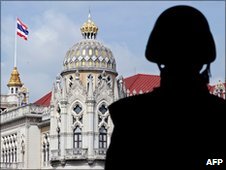 The Thai government has extended a state of emergency in 19 provinces, including the capital Bangkok, because of fears of renewed violence.
The Thai government has extended a state of emergency in 19 provinces, including the capital Bangkok, because of fears of renewed violence.
The emergency decree was revoked in five other provinces, after a three-month deadline expired.
The law was imposed during mass anti-government protests earlier this year in which 90 people were killed.
Prime Minister Abhisit Vejjajiva told the BBC on Monday that there would be a gradual lifting of emergency law.
Under emergency rule, public gatherings of more than five people are banned and security forces have the right to detain suspects for 30 days without charge.
There have been calls by human rights organisations to lift what they describe as a "draconian" law, saying it risks driving opposition underground.
'Legitimate frustrations'
The Centre for the Resolution of Emergency Situations (Cres) had recommended to cabinet that emergency rule be extended across all affected provinces.
The Cres is a committee comprising representatives of each branch of the armed forces, the police and government ministries; key roles in Cres are held by military nominees.
It was set up to manage the government's response to the so-called red-shirt anti-government protests in April and May this year.
The demonstrations, which paralysed much of the capital, were broken up by the military, protest leaders were arrested and much of the opposition media has been silenced by the government.
Mr Abhisit says he is beginning a process of reconciliation.
However, the BBC's Alastair Leithead in Bangkok says a member of the red-shirt movement, currently in hiding in Thailand, has warned an underground group is already training in bomb making.
Cres spokesman Colonel Sansern Kaewkamnerd said weapons believed to have been taken by anti-government protesters had not yet been retrieved.
"So keeping the state of emergency decree is likely to help maintain security and economic stability," he said.
More than 400 people have been arrested under emergency law.
The International Crisis Group has called for emergency rule to be lifted, warning that the "legitimate frustrations" of the anti-government movement were "being forced underground and possibly towards illegal and violent actions".
The report, Bridging Thailand's Deep Divide, called for the release of all those detained, and an end to the "sweeping ban" on opposition media outlets.



